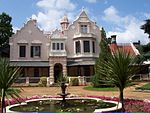Zuid-Afrikaans Hospital
AC with 0 elementsAfrikaner culture in PretoriaBuildings and structures in PretoriaHospitals established in 1904Hospitals in Gauteng ... and 1 more
South African hospital stubs

Zuid-Afrikaans Hospital (Afrikaans: Het Zuid-Afrikaans Hospitaal en Diakonessenhuis) is a private, non-profit hospital in Muckleneuk, Pretoria, South Africa, where the working language is both English and Afrikaans.
Excerpt from the Wikipedia article Zuid-Afrikaans Hospital (License: CC BY-SA 3.0, Authors, Images).Zuid-Afrikaans Hospital
Bourke Street, Pretoria Lukasrand
Geographical coordinates (GPS) Address External links Nearby Places Show on map
Geographical coordinates (GPS)
| Latitude | Longitude |
|---|---|
| N -25.762222222222 ° | E 28.206111111111 ° |
Address
Zuid Afrikaans Hospital (ZAH)
Bourke Street 255
0002 Pretoria, Lukasrand
Gauteng, South Africa
Open on Google Maps







